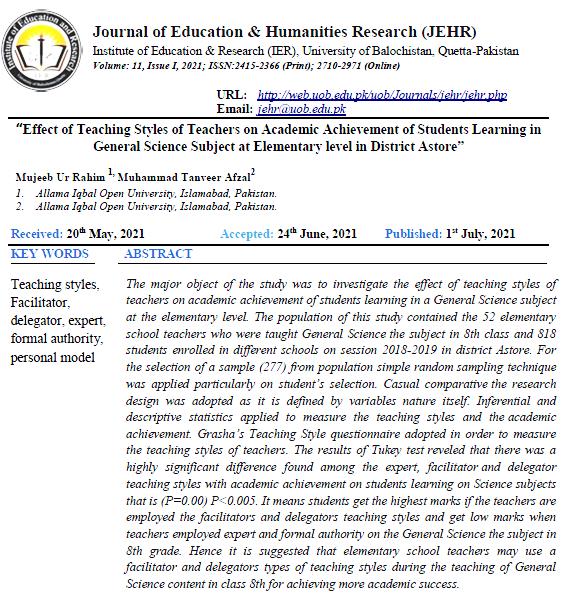Effect of Teaching Styles of Teachers on Academic Achievement of Students Learning in General Science Subject at Elementary level in District Astore
Keywords:
Teaching styles, Facilitator, delegator, expert, formal authority, personal modelAbstract
The major object of the study was to investigate the effect of teaching styles of teachers on academic achievement of students learning in a General Science subject at the elementary level. The population of this study contained the 52 elementary school teachers who were taught General Science the subject in 8th class and 818 students enrolled in different schools on session 2018-2019 in district Astore. For the selection of a sample (277) from population simple random sampling technique was applied particularly on student’s selection. Casual comparative the research design was adopted as it is defined by variables nature itself. Inferential and descriptive statistics applied to measure the teaching styles and the academic achievement. Grasha’s Teaching Style questionnaire adopted in order to measure the teaching styles of teachers. The results of Tukey test reveled that there was a highly significant difference found among the expert, facilitator and delegator teaching styles with academic achievement on students learning on Science subjects that is (P=0.00) P<0.005. It means students get the highest marks if the teachers are employed the facilitators and delegators teaching styles and get low marks when teachers employed expert and formal authority on the General Science the subject in 8th grade. Hence it is suggested that elementary school teachers may use a facilitator and delegators types of teaching styles during the teaching of General Science content in class 8th for achieving more academic success.
References
Audu, C. T. (2018). Influence of teaching styles on students’ achievement and interest among biology students in secondary schools in Taraba State Nigeria. Advances in Social Sciences Research Journal, 5(5).
Bibace, R., Catlin, R. J., Quirk, M. E., Beattie, K. A., & Slabaugh, R. C. (1981). Teaching styles in the faculty-resident relationship. The Journal of family practice, 13(6), 895-900.
Bennett, N., Jordan, J., Long, G., & Wade, B. (1976). Teaching styles and pupil progress.
Canto-Herrera, P., & Salazar-Carballo, H. (2010). Teaching Beliefs and Teaching Styles of Mathematics Teachers and Their Relationship with Academic Achievement. Online Submission.
Daluba, N. E. (2013). Effect of Demonstration Method of Teaching on Students' Achievement in Agricultural Science. World Journal of Education, 3(6), 1-7.
Dr. Isa, S. G., Dr. Mammam, M. A., Badar, Y. and Bala, T. 2020. The impact of teaching methods on academic performance of secondary school students in Nigeria. International Journal of Development Research, Vol. 10, Issue, 06, pp. 37382-37385.
Flanders, N. A. (1970). Analyzing teaching behavior.
Ganyaupfu, E. M. (2013). Teaching methods and students’ academic performance. International Journal of Humanities and Social Science Invention, 2(9), 29-35.
Grasha, A. F. (2002). The dynamics of one-on-one teaching. College Teaching, 50(4), 139-146.
Grasha, A. F. (1996). Teaching with style: A practical guide to enhancing learning by understanding teaching and learning styles. Alliance publishers.
Grasha, A. F. (1994). A matter of style: The teacher as expert, formal authority, personal model, facilitator, and delegator. College teaching, 42(4), 142-149.
Grasha, A. F., & Yangarber-Hicks, N. (2000). Integrating teaching styles and learning styles with instructional technology. College teaching, 48(1), 2-10.
Hein, V., Ries, F., Pires, F., Caune, A., Ekler, J. H., Emeljanovas, A., & Valantiniene, I. (2012). The relationship between teaching styles and motivation to teach among physical education teachers. Journal of sports science & medicine, 11(1), 123.
Hesson, M., & Shad, K. F. (2007). A student-centered learning model. American Journal of Applied Sciences, 4(9), 628-636.
Huang, J. (2009). What happens when two cultures meet in the classroom?. Journal of instructional psychology, 36(4).
Hoyt, D. P., & Lee, E. J. (2002). Teaching" Styles" and Learning Outcomes. Idea Research Report. Kansas State University
Jarvis, P. (2004). Adult education and lifelong learning: Theory and practice. Routledge.
Kaplan, E. J., & Kies, D. A. (1995). Teaching styles and learning styles: Which came first?. Journal of Instructional Psychology.
Lockette, T. (2006). UF study: Contrasting teaching styles in US-China classrooms may influence students’ learning preferences. UF News.
Lowman, J., & Lowman, J. (1984). Mastering the techniques of teaching (Vol. 1990). San Francisco: Jossey-Bass.
Mulawo, C. (2017). Secondary school science departments' use of examinations council of Zambia examiners' reports in Solwezi district (Doctoral dissertation).
Sogoni, P. K. (2017). Performance in kinematics using cooperative learning among secondary school students in sabatia sub-county, Kenya.
Solomon, D., & Kendall, A. J. (1979). Children in classrooms: An investigation of person-environment interaction. Greenwood.
Tebabal, A., & Kahssay, G. (2011). The effects of student-centered approach in improving students' graphical interpretation skills and conceptual understanding of kinematical motion. Latin-American Journal of Physics Education, 5(2), 9.




